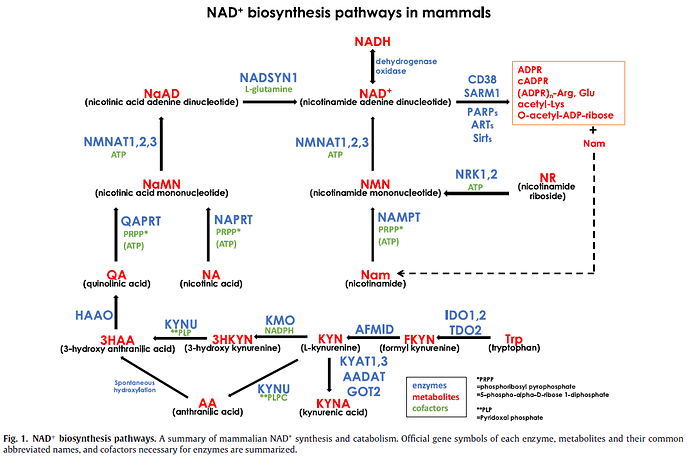NMN (Nicotinamide Mononucleotide), Vitamin B3 (niacin, NA, Nicotinic Acid), Nam (Nicotinamide) and NR (Nicotinamide Riboside are all different.
The aim of these molecules is boosting Nicotinamide adenine dinucleotide (NAD+) levels.
NAD+ levels naturally decline as the body ages [14], by up to 50% in human skin tissue by the age of 40-60[15].
The below chart shows the NAD+ biosynthesis pathways:
Source - Metabolic aspects of neuronal degeneration: From a NAD+ point of view.
Supplementing with NAD+ itself is not an option to boost NAD+ levels, because it is too big to readily cross cell membranes to enter cells, and therefore would be unable to positively affect metabolism [23].
Vitamin B3 (niacin, NA, Nicotinic Acid)
Niacin, Vitamin B3, or NA (Nicotinic Acid) is able to increase NAD+ levels, but not universally - it does not act as a precursor to NAD+ in important areas such as the brain, skeletal muscle or neurons.
It also often leads to severe flushing, as nicotinic acid binds to the GPR109A receptor[1,2].
In order to be converted to NAD+ by the body, vitamin b3 or niacin or NA (nicotinic acid) is converted to NaMN ( nicotinic acid mononucleotide), and then to NaAD ( Nicotinic acid adenine dinucleotide), and then to NAD+.
NR (Nicotinamide Riboside)
Nicotinamide Riboside is converted to NMN by phosphorylation with the help of nicotinamide riboside kinase (NRK1 and NRK2)[3]. The NMN formed is then enzymatically converted to NAD+.
Nam (Nicotinamide)
Nicotinamide is converted to NMN by the body [4], which is then enzymatically converted to NAD+.
NMN (Nicotinamide Mononucleotide)
NMN is enzymatically converted to NAD+ by the body.
Supplementing with NMN, a precursor to NAD+, has been shown to increase NAD+ levels in mice [3], and is expected to show increased NAD+ levels in humans when clinical trials are completed, as other NAD+ precursors have done[29,30].
Multiple human trials are currently in progress [10,11,31], with NMN at least appearing to be safe for humans to consume, and preliminary results are said to be promising[12].
